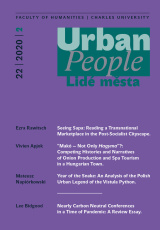Seeing Sapa
Reading a Transnational Marketplace in the Post-Socialist Cityscape
DOI:
https://doi.org/10.14712/12128112.2347Klíčová slova:
Sapa marketplace, urban space, transnationalism, post-socialist cities, Vietnamese-Czech diasporaAbstrakt
Central and Eastern European post-socialist states have undergone profound political and economic changes in the three decades since 1989. Although the dramatic transformations of the immediate post-socialist period were highly visible and widely documented, recent political and economic developments are crucial to understanding the region’s contemporary conjuncture. The broad trend of moving away from liberalism and toward an emergent authoritarian politics, both in the Visegrád states and elsewhere, raises new uncertainties regarding the rule of law, the civil rights of minority groups, and the status of democratic rule. Meanwhile, the region’s increasingly globalised economies have variously embraced and shunned Western economic influence, maintaining and cultivating trade and political linkages with the former “Soviet ecumene” and in Southeast and East Asia, notably China and Vietnam. Amid these trends, novel forms of urban space locate and reveal a variety of perspectives on the nature of the post-socialist transition. Since its founding in 1999, Sapa marketplace, on the outskirts of Prague, has become a focus of transnational trade networks and a cultural centre of the Vietnamese-Czech community in Czechia. Czech scholars have emphasised Sapa as an important centre of Vietnamese-Czech culture in the Czech Republic; I consider more expansively how Sapa can be conceptualised as a transnational and postsocialist urban space, and how legacies of migration and informal economic activity have contributed to its formation. I explore the material present of Sapa, which helps to locate, focus, and reveal specific legacies of the socialist past and the dynamics of the post-socialist transition.
Stahování
Publikováno
Jak citovat
Číslo
Sekce
Licence
Copyright (c) 2022 Ezra Rawitsch

Tato práce je licencována pod Mezinárodní licencí Creative Commons Attribution 4.0 .


